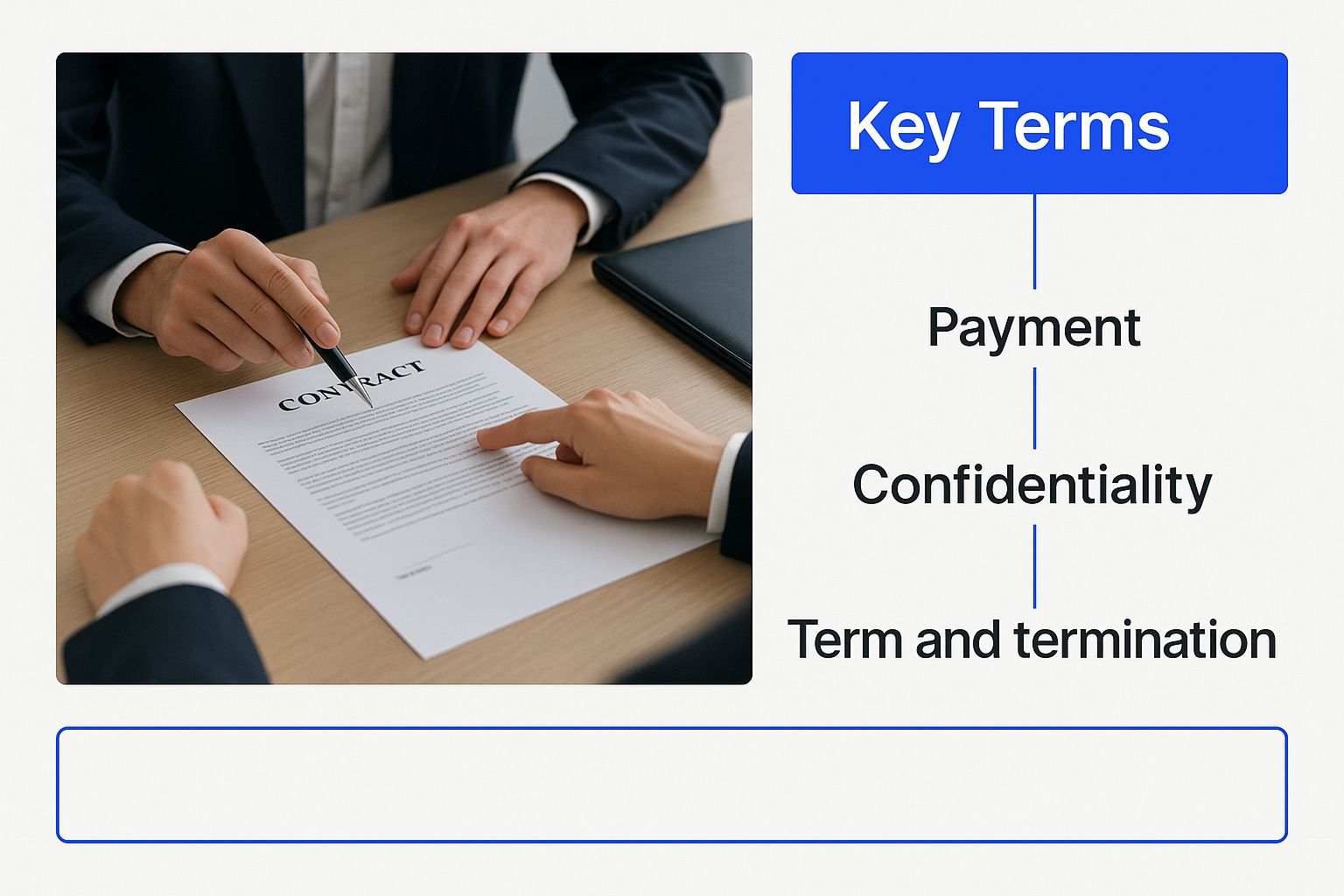Your Guide to Affiliate Contract Agreements
Your Guide to Affiliate Contract Agreements
Ollie Efez
September 23, 2025•18 min read

An affiliate contract agreement is the formal, legally binding document that sets out the terms between a company and its affiliate partners. Think of it as the official playbook for your partnership, making sure everyone knows the rules and how to win from the very beginning.
Why Your Partnership Needs a Game Plan
Could you imagine playing a championship game without a rulebook? It would be pure chaos. No one would know how to score, what's out of bounds, or even how the game is won. An affiliate agreement does the same job for your business relationship—it’s the game plan that lays out exactly how both sides can succeed together.
Without this core document, you're just running on assumptions. That's a recipe for disaster, often leading to payment disputes, confusion over marketing methods, and soured relationships. A solid agreement cuts through all the guesswork, building a partnership on a foundation of trust and clarity. It elevates a casual handshake deal into a professional, scalable collaboration.
Setting Clear Expectations from Day One
At its heart, an affiliate agreement is all about setting crystal-clear expectations. It's not there to stifle an affiliate's creativity but to guide it in a direction that aligns with your brand's voice, goals, and legal requirements. This clarity is a win-win for everyone:
- For Businesses: It’s your safety net. It protects your brand identity, trademarks, and ensures affiliates are promoting your products ethically and effectively.
- For Affiliates: It provides peace of mind. They know exactly how commissions are calculated, when they’ll get paid, and what tools and support they can count on. To better understand the affiliate's role, you might be interested in our glossary definition of an affiliate.
This shared understanding is the bedrock of any partnership built to last. With the global affiliate marketing industry now valued at over $18.5 billion, the need for structured, professional agreements has never been more critical. This incredible scale makes it essential to manage relationships with clear, transparent rules. Find more surprising affiliate marketing statistics on Wix.com.
An affiliate contract isn't just legal paperwork; it's a strategic tool. It solves problems before they even start by creating a shared vision of what success, responsibility, and rewards look like.
Ultimately, this document is your blueprint for a profitable and healthy affiliate program. It defines the rules of engagement, details the commission structure, and gives you a clear process for handling any disagreements that might come up. By putting in the effort to create a thorough affiliate contract, you're not just protecting your business—you're investing in a partnership designed for long-term growth.
The Essential Clauses Every Agreement Needs
An affiliate contract is so much more than a legal formality; it's the very blueprint for a healthy, profitable partnership. Think of it as the DNA of your collaboration, where each clause spells out a specific trait of the relationship. When you get these foundational pieces right, you leave no room for confusion and protect both yourself and your affiliates from headaches down the road.
This breakdown covers the absolute must-have terms for any well-structured agreement.

As you can see, things like commission structures and payment schedules are front and center. They directly impact how and when your partners get paid for their hard work, so they deserve careful attention.
Defining the Commission Structure
Let’s be honest, this clause is the heart of the entire agreement. It answers the one question every affiliate has: "How do I get paid?" A vague or confusing commission structure is a recipe for disaster. You have to be crystal clear about what specific action triggers a payout.
Is it a percentage of a sale? A flat fee for every qualified lead? Or maybe a few cents for every click? Your agreement needs to spell this out precisely. For instance, a software company might offer a 20% recurring commission on subscription fees for the first 12 months of a new customer's plan.
This is also where you define what a "qualified" sale or lead actually means. If a customer buys a product but returns it within 30 days, does the affiliate still get the commission? Nailing down these details builds trust and prevents the awkwardness of having to claw back payments.
Clarifying Payment Terms and Schedule
Once you've defined how affiliates earn their money, the next logical step is explaining when and how they receive it. This part of the contract strips away any and all ambiguity from the payment process, so your partners know exactly what to expect.
Make sure this clause includes these key details:
- Payment Threshold: The minimum balance an affiliate needs to earn before you send a payment (e.g., $100).
- Payment Frequency: How often you pay out, such as NET-30 (meaning 30 days after the month the commission was earned).
- Payment Method: The specific ways you’ll send the money. Common options include PayPal, direct deposit, or a platform like Stripe.
Imagine an affiliate expecting to get paid at the end of the week, only to discover your company pays out monthly on the 15th. That’s a simple misunderstanding that can sour a relationship fast if it isn't clarified in writing from day one.
Outlining Affiliate Responsibilities and Restrictions
This section lays down the ground rules for promotion. It's where you define the "do's and don'ts" for affiliates representing your brand. Think of it as the partnership's official code of conduct, designed to protect your reputation and keep all marketing efforts ethical and above board.
Common rules and restrictions often include:
- Prohibited Marketing Channels: Outlawing things like email spam, shady cookie-stuffing tactics, or bidding on your company's branded keywords in paid search ads.
- Approved Promotional Language: Requiring affiliates to use company-approved messaging and avoid making wild, unsubstantiated claims about your product.
- Disclosure Requirements: Mandating that affiliates clearly disclose their partnership with you, in line with FTC guidelines.
A solid set of responsibilities ensures every promotional effort reflects your brand’s values and meets legal standards.
By clearly stating what is and isn't allowed, you empower affiliates to be creative within a safe and effective framework, preventing brand damage and legal complications down the line.
Specifying Intellectual Property Rights
This part of the agreement governs how an affiliate can—and cannot—use your company's branded assets. It clarifies that you own all your logos, trademarks, and marketing materials, but you're granting the affiliate a limited license to use them for the sole purpose of promoting your products.
For example, the contract might state that an affiliate can use your official logo on their review blog but is not allowed to alter its colors or shape. This is crucial for preventing brand dilution and maintaining a consistent, professional image across the web.
Establishing Term and Termination
Every partnership has a lifecycle. This clause defines the official start and end date of the agreement, plus the conditions under which either party can walk away. It might specify an initial term, like one year, with a clause for automatic renewal unless otherwise noted.
More importantly, it spells out the grounds for termination. This could be "for cause" (like a direct breach of the contract) or "without cause," which usually requires a written notice period of 30 days. This gives everyone a clear exit strategy, ensuring the end of a partnership can be just as smooth as its beginning. Considering that 81% of brands now run affiliate programs, having a rock-solid agreement is simply non-negotiable. Discover more insights on the high ROI of affiliate marketing on AffiliateStatistics.marketing.
Don't Skip the Fine Print: Key Legal and Compliance Rules
Once you've nailed down commissions and responsibilities, it's time to tackle the legal side of things. Think of your contract's core clauses as the engine of a car. Legal compliance? That's your steering, brakes, and airbags. You can drive without them for a little while, but you're heading for a crash.
These rules aren't just bureaucratic suggestions; they're legal requirements that protect your business, your partners, and, most importantly, the customers. A well-crafted agreement bakes these rules right into the partnership, making sure everyone is playing by the same ethical and legal playbook from the get-go.

Upholding FTC Disclosure Requirements
Let's start with the big one: transparency. Nothing erodes consumer trust faster than feeling tricked. The Federal Trade Commission (FTC) has very clear rules about this, requiring affiliates to disclose their "material connection" to the brands they promote. In simple terms, people need to know the affiliate might get paid if they buy something.
Your affiliate agreement must require your partners to follow these guidelines. We're not talking about a disclosure hidden in tiny font in the footer or buried deep in a "Terms of Service" page. The FTC has been crystal clear—disclosures have to be hard to miss.
Your contract should spell out exactly what you expect, such as:
- Using unambiguous language like #ad, #sponsored, or a straightforward statement like, "As an affiliate, I earn from qualifying purchases."
- Placing the disclosure right next to the affiliate link. It has to be visible before someone clicks.
- Making sure these rules apply everywhere—blog posts, social media, YouTube videos, and email newsletters.
Ignoring these rules can bring hefty fines down on both the affiliate and your company. It's a shared responsibility, and your contract needs to make that perfectly clear.
Respecting Data Privacy and Consumer Rights
In today's world, how you handle customer data is everything. With laws like Europe's GDPR and California's CCPA, the standards for collecting and using personal information have never been higher.
Your affiliate agreement needs to tackle these obligations head-on. For instance, if an affiliate runs an email list to promote your products, they need to have gathered those emails with proper consent. The contract should explicitly forbid them from using shady tactics to get data or sharing it without permission.
Your agreement should act as a legal shield. It ensures that anyone promoting your brand is held to the same high data privacy standards you follow internally. This protects you from liability and shows your customers you take their rights seriously.
This clause makes it the affiliate's job to comply with all relevant data privacy laws, which helps protect your business from legal trouble and reputational damage. It’s a complex area, and you can dive deeper into how SaaS companies can avoid costly compliance traps in our dedicated guide.
Including a Confidentiality Clause
Over the course of your partnership, affiliates might get a peek behind the curtain. They could learn about unreleased products, see your upcoming marketing plans, or get access to sensitive sales data. A confidentiality clause is a non-negotiable part of the agreement that legally binds them to keep that information secret.
This is standard practice for a reason. It protects your trade secrets and helps you maintain your competitive edge. The clause should clearly define what counts as "confidential information" and what happens if that trust is broken.
By weaving these legal and compliance requirements into your affiliate contract, you're not just checking boxes. You're building a foundation of trust, minimizing risk, and creating an affiliate program that's built to last.
How to Draft Your Affiliate Contract Agreement
Alright, let's move from theory to action. Drafting the actual affiliate contract might sound like a job for a team of lawyers, but it’s a much more straightforward process than you think. Whether you're starting from a blank page or using a template, the goal is to create a document that's clear, fair, and truly fits your business.
Think of it like building with LEGOs. A template gives you all the basic bricks, but you're the one who has to snap them together to build the castle you envision. Your business has its own unique goals and rules, and your contract needs to reflect that.

Start with Simple and Clear Language
If you take only one piece of advice, let it be this: avoid complex legal jargon. Your contract is a communication tool first and a legal document second. If your affiliates can't understand the rules, they can't follow them. It's that simple.
Use plain English. Instead of "heretofore," just say "before now." Rather than a dense clause about "indemnify and hold harmless," try explaining it in a way anyone can grasp, like "you agree to cover any legal costs if your actions cause us to get sued."
An agreement that requires a law degree to understand is a failed agreement. The goal is clarity, not complexity. A contract that both parties can easily read and comprehend builds a foundation of trust from day one.
Tailor the Agreement to Your Business Needs
A generic, copy-pasted contract is a recipe for trouble. Every affiliate program has its own rules of engagement, and a one-size-fits-all document won't protect your brand or set your partners up for success. You have to customize it.
This is where you get into the nitty-gritty of what’s allowed and what’s not. Think about adding specific clauses that cover:
- Prohibited Marketing Tactics: Be crystal clear about what affiliates cannot do. This is your chance to forbid practices like bidding on your branded keywords in Google Ads, using spammy email lists, or creating copycat websites that impersonate your brand.
- Performance Expectations: Do you have a minimum bar for performance? Define it here. For instance, you might require affiliates to generate at least one sale every 90 days to keep their account active.
- Creative Guidelines: Control how your brand is presented. Specify that affiliates must only use your approved banners, logos, and ad copy. This prevents them from creating their own materials that might be off-brand or misleading.
Navigate the Negotiation Process with Confidence
While many of your terms will be non-negotiable, don't be surprised if a high-performing affiliate wants to discuss certain points. Being prepared for these conversations is how you build strong, lasting partnerships.
The most common points of negotiation are:
- Commission Rates: An influencer with a huge, engaged audience might ask for a higher commission percentage. In return, you might get a dedicated video review or a premium placement on their website.
- Cookie Duration: Some affiliates, especially those in industries with a long sales cycle, might ask for a longer cookie window (say, 60 or 90 days instead of your standard 30).
- Payment Terms: While less common, a major partner driving serious volume might ask for faster payouts, like getting paid every 15 days instead of every 30.
When you approach negotiations with a collaborative mindset, it shows you value the partnership. Be clear about which terms are flexible and which are firm. This back-and-forth actually helps build a much stronger, more committed relationship.
This level of detail is more important than ever. According to Forrester, 78% of senior marketers planned to expand their affiliate programs, with US spending predicted to hit $15 billion by 2028. As programs grow, so do cross-border partnerships, which means your contract needs to be solid on things like jurisdiction and currency. You can discover more about the growth of affiliate marketing from Fintel Connect. By drafting a thorough affiliate agreement now, you’re setting your program up for secure, scalable growth down the road.
Adapting an Affiliate Agreement Template
https://www.youtube.com/embed/09jnXIpraJc
Moving from theory to a real, working document is where things get exciting. To help you bridge that gap, we've put together a foundational template you can use as the skeleton for your own affiliate contract agreement.
Think of this template not as a finished product, but as high-quality clay. It's ready for you to mold to the unique shape of your business and program.
We've structured it to mirror the essential clauses we’ve already walked through, turning those abstract concepts into a practical tool. You'll see key areas that need your input, like [Commission Rate] or [Cookie Duration], clearly marked so you can easily personalize them. This framework gives you a huge head start on creating an agreement that’s professional, clear, and fair.
But I have to be direct here: a template is only a starting point. It can’t possibly account for the specific quirks of your industry, your unique business model, or the local laws you need to follow.
CRITICAL REMINDER: This template is for educational purposes only and is not a substitute for professional legal advice. Always have your final affiliate agreement reviewed by a qualified attorney to ensure it's legally sound and fully protects your interests.
Personalizing Your Template
Adapting a template is about so much more than just filling in the blanks. It’s about making strategic decisions that will define the rules of your entire program. Every placeholder represents a critical choice that will shape your relationships with affiliates, so every detail truly matters.
Take the [Commission Rate], for example. It isn't just a number. Are you offering a flat fee when someone signs up for a demo, or is it a percentage of the initial sale? What about a recurring commission for subscription renewals? These decisions directly impact the kind of affiliates you attract and how motivated they are to promote you.
The same goes for the [Prohibited Activities] section. A generic list might miss restrictions that are crucial for your brand. You might need to forbid affiliates from creating social media profiles that could be mistaken for your official company account, or from running ads on platforms where your brand already has a strong presence.
Checklist for Customizing Your Agreement Template
To make this process a bit more straightforward, here's a quick checklist to guide you. It covers the most common variables you'll need to think through as you tailor the template for your affiliate contract agreement.
When you thoughtfully adapt a template, you’re creating much more than just a legal document. You’re building a clear, comprehensive, and customized framework that sets solid expectations, prevents future misunderstandings, and paves the way for a successful and scalable affiliate program.Common Mistakes to Avoid in Your Agreement
Knowing what to do is one thing, but knowing what not to do can save you a world of headaches. A poorly written affiliate contract is a breeding ground for loopholes, arguments, and partnerships that sour fast. Sidestepping these common pitfalls is the key to creating an agreement that actually protects you and your affiliates.
One of the biggest blunders we see is using vague, fuzzy language. Imagine a contract that promises payment for "successful conversions." Okay, but what does that really mean? Does a sale that gets refunded still count? Is a free trial sign-up a "conversion"?
That kind of ambiguity is a ticking time bomb for disputes. Without sharp, clear definitions, you’re practically inviting disagreements that can tarnish your brand and cost a fortune to resolve.
Overlooking Termination and Post-Termination Rules
Another major oversight is glossing over the breakup clause. What happens when the partnership ends? If your contract is silent on post-termination commissions, you're in for a messy situation. Let's say an affiliate sends you a lead, the contract ends tomorrow, and that lead buys something next month. Who gets paid?
Your agreement needs to spell this out, leaving no room for interpretation. It should clearly cover:
- The notice period required to end the partnership without cause.
- Whether commissions are paid on sales that close after termination but came from the affiliate's link (this is often called a "commission tail").
- What happens to the affiliate's access to your marketing assets after they're out of the program.
Without these ground rules, the end of a partnership can become a chaotic and bitter affair. It’s in these very situations that you see when affiliate contracts backfire due to hidden legal pitfalls, and a solid agreement is your first line of defense.
A strong affiliate contract doesn't just manage the partnership's success; it also provides a clear, fair roadmap for when the relationship ends. This foresight prevents future conflicts and protects everyone's interests.
Neglecting Critical Compliance Needs
Finally, a surprising number of agreements barely touch on legal and compliance duties. Forgetting to require clear FTC disclosures or ignoring data privacy laws isn’t a tiny slip-up—it's a massive legal risk. Your contract must state that affiliates are responsible for following all relevant laws.
If an affiliate uses shady marketing tactics, your brand could be the one facing the consequences. By outlining these responsibilities directly in the agreement, you build a legally sound foundation and encourage a culture of honest, transparent marketing from day one.
Got Questions? We’ve Got Answers.
Jumping into any kind of contract can feel a little intimidating, and it's totally normal to have a few questions. Let's clear up some of the most common ones that pop up when you're dealing with affiliate agreements.
Can I Change an Affiliate Contract After It’s Signed?
Think of a signed contract as a promise set in stone—you can't just chip away at it on your own. If you need to change something like a commission rate or a payment date, you’ll need to get the affiliate to agree, too.
Any changes have to be done officially through a new document, like an addendum, that both you and your affiliate sign. This keeps everything transparent and ensures your partnership stays on solid legal ground.
Is an Affiliate Contract Actually Legally Binding?
Yes, absolutely. A signed affiliate contract agreement isn't just a formality; it's a real, enforceable legal document. It clearly lays out who is responsible for what.
If one person doesn't hold up their end of the bargain, the contract is what you'll rely on in court. It’s your safety net.
A signed affiliate agreement transforms a casual handshake into a formal business relationship. It provides a legal framework that protects both parties, ensuring commitments are taken seriously and that there is a clear path for resolving disputes if they arise.
What Happens If There's No Written Agreement?
Wingin' it without a written agreement is a huge gamble. Without a contract, there's no official proof of what you both agreed to. This is a recipe for disaster, leading to arguments over commissions, how they can market your products, or how the partnership can end.
A verbal agreement is incredibly hard to enforce. A simple, clear document protects both your business and your affiliates from messy disputes that could have been easily avoided.
How Long Should an Affiliate Contract Last?
The length of an affiliate contract agreement, often called the "term," really depends on your goals. A pretty standard approach is to set it for one year with an automatic renewal clause—often called an "evergreen" clause.
This means the contract keeps rolling over unless someone gives notice to end it, typically with 30 days' notice. This setup provides stability but also gives everyone a clean way out if the partnership isn't working anymore.
Ready to build and scale your affiliate program with confidence? LinkJolt provides all the tools you need to manage partnerships, track performance, and automate payouts seamlessly. Start your journey with LinkJolt today and see how easy affiliate management can be.
Watch Demo (2 min)
Trusted by 300+ SaaS companies
Start Your Affiliate Program Today
Get 30% off your first 3 months with code LINKJOLT30
✓ 3-day free trial
✓ Cancel anytime